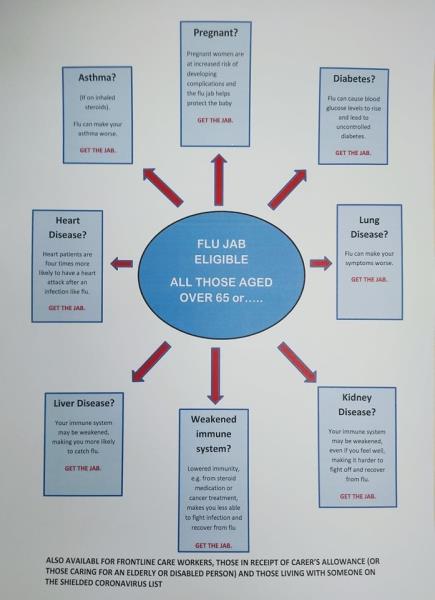Seasonal flu - information
We still have flu vaccines available at the surgery, if you are eligible and would like to receive your flu vaccination please call reception on 02380 221964.
Click here to check your eligibility.

FLU VACCINE INFORMATION
- In the UK the flu vaccine is available each year from late September or early October onwards. It is recommended to get the flu vaccine in the autumn, before outbreaks of flu have started. It takes up to two weeks after vaccination for you to be protected against flu.
- The flu vaccine does not contain any live flu viruses and cannot give you flu.
There are two different types of flu vaccine will be offered in the UK:
- Those aged 65 or over will be offered an adjuvanted quadrivalent flu vaccine (protecting against four strains of flu virus) which also contains an adjuvant. (Adjuvants are substances which help to strengthen and lengthen the immune response to the vaccine.)
- Adults from 18 to 64 years in eligible ‘at risk’ groups will be offered a quadrivalent flu vaccine (protecting against four strains of flu virus). Babies and children aged from 6 months to 17 years who cannot have the nasal flu vaccine will also be offered a quadrivalent flu vaccine.
For more information on the flu vaccine click here
Introduction
Flu is an infectious and common viral illness spread by coughs and sneezes.
It's not the same as the common cold. Flu is caused by a different group of viruses. Symptoms tend to be more severe and last longer.
You can catch flu – short for influenza – all year round, but it is especially common in winter, which is why it is also known as "seasonal flu".
Flu causes a sudden high temperature, headache and general aches and pains, tiredness and a sore throat. You can also lose your appetite, feel nauseous and have a cough.
Flu symptoms can make you feel so exhausted and unwell that you have to stay in bed and rest until you feel better.
When to see a doctor
If you are otherwise fit and healthy, there is usually no need to see a doctor if you have flu-like symptoms.
The best remedy is to rest at home, keep warm and drink plenty of water to avoid dehydration.
You can take paracetamol or ibuprofen to lower a high temperature and relieve aches.
You should see a doctor if you have flu-like symptoms and you:
- are aged 65 or over
- are pregnant
- have a long-term medical condition such as diabetes, heart disease, lung disease, kidney disease or a neurological disease
- have a weakened immune system
This is because flu can be more serious for you, and your doctor may want to prescribe antiviral medication.
Antiviral medicine can lessen the symptoms of flu and shorten its duration, but treatment needs to begin soon after flu symptoms start for it to be effective.
Antibiotics are of no use in the treatment of flu because it is caused by a virus and not by bacteria.
How long does flu last?
If you have flu, you generally start to feel ill within a few days of being infected.
Symptoms peak after two to three days and you should begin to feel much better after a week or so, although you may feel tired for much longer.
You are usually infectious – that is, able to pass flu on to others – a day before your symptoms start and for a further five or six days. Children and people with weaker immune systems, such as cancer patients, may remain infectious for longer.
Elderly people and anyone with certain long-term medical conditions are more likely to have a bad case of flu, and are also more likely to develop a serious complication such as a chest infection.
In the UK, about 600 people a year die from a complication of seasonal flu. This rises to around 13,000 during an epidemic.
Preventing the spread of flu
The flu virus is spread in small droplets of fluid coughed or sneezed into the air by an infected person. These droplets can travel a metre or so and infect anyone within range who breathes them in.
Flu can also spread if someone with the virus transfers it on their fingers. For example, if you have flu and you touch your nose or eyes and then touch someone else, you may pass the virus on to them.
Similarly, if you have flu and touch hard surfaces such as door handles with unwashed hands, other people who touch the surface after you can pick up the infection.
You can stop yourself catching flu or spreading it to others by being careful with your hygiene.
Always wash your hands regularly with soap and water, as well as:
- regularly cleaning surfaces such as your computer keyboard, telephone and door handles to get rid of germs
- using tissues to cover your mouth and nose when you cough or sneeze
- putting used tissues in a bin as soon as possible
You can also help stop the spread of flu by avoiding all unnecessary contact with other people while you're infectious. You should stay off work until you are no longer infectious and you're feeling better.